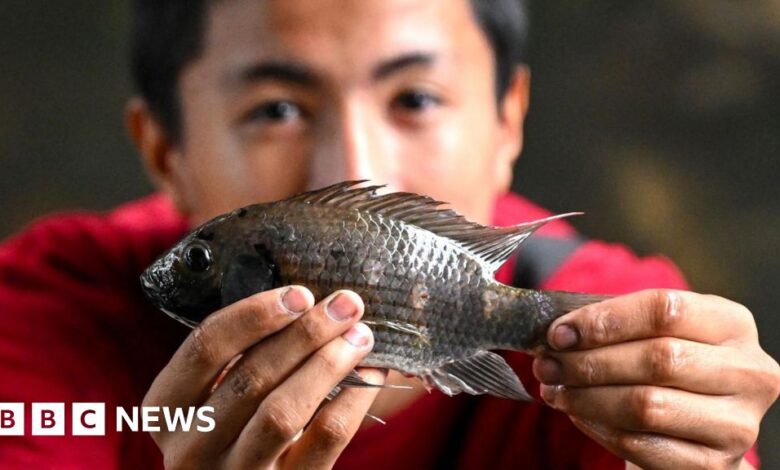Thailand Wages War Against Invasive Black Tilapia

The species has been described as the “most invasive species” ever to appear in Thailand – one that poses a huge risk of causing environmental damage, officials said.
Attempts to control it have led to crowds wading into the lake and genetically modifying it.
However, black tilapia continues to spread through Thailand’s waterways, affecting 17 provinces so far.
A parliamentary investigation has been launched to find out the cause and proponent, with Bangkok MP Nattacha Boonchaiinsawat stating: “We will not leave a devastated ecosystem for the next generation.”
So can the Thai government win this battle – and how exactly did this West African fish cause disaster halfway around the world?
Thailand has experienced several outbreaks of black tilapia in the past, but none as widespread as the most recent outbreak.
Mr Nattacha estimates that this particular outbreak will cost the Thai economy at least 10bn baht ($293m; £223m).
The core problem is that black tilapia eat small fish, shrimp and snail larvae, which are important aquaculture products in Thailand.
So for months now, the government has been encouraging people to catch black tilapia, which has found its way into rivers and swamps. The fish thrives in brackish water, but can survive in both fresh and salt water.
The Thai government has also doubled the amount it will pay fishermen for catching the fish, to 15 baht ($0.42; £0.33) per kilogram. The result? On the outskirts of Bangkok, crowds wade knee-deep in water in the hope of catching black tilapia in their plastic pots.
Authorities have also released predators of black tilapia – Asian bass and long-whiskered catfish – to hunt them.
However, they are up against a species that reproduces at a rapid rate: females can lay up to 500 fry at a time.
And so authorities have also developed a genetically modified strain of black tilapia that can give birth to sterile offspring, planning to release them as early as later this year, in hopes of stemming the species’ surge.
But Mr Nattacha told BBC Thai the government needed to do more.
“Who will win?” he wondered. “We need everyone to keep a close eye on the case, otherwise this will go quiet, and we will pass this situation on to the next generation.”
So how did this fish – easily recognizable by the black spots on its chin and cheeks – get to Thailand?
One theory that parliament has considered is that an experiment by food giant Charoen Pokphand Food (CPF) 14 years ago caused the spread.
The company, which produces animal feed and operates shrimp and cattle farms, imported 2,000 fish from Ghana in late 2010. The company said all the fish died and were properly buried.
Two years later, black tilapia disease broke out in Thailand, including the CPF laboratory area, according to local broadcaster Thai PBS.
But CPF – the agricultural arm of one of Thailand’s largest conglomerates, Charoen Pokphand Group (CP Group) – has denied the allegations. It has also threatened to sue those spreading what it calls “false information” on the issue.
The agency is working with state agencies to combat the spread of invasive species.
“Although the company is confident that they are not the cause of the outbreak, they are not indifferent and are willing to cooperate with the government to alleviate the suffering of the people,” said Premsak Wanuchsoontorn, CPF’s aquaculture and development research officer.
However, CPF officials only attended the parliamentary hearing once. Before that, they explained in writing to lawmakers.
Thailand’s Department of Fisheries Director-General Bancha Sukkaew noted that only one private company has applied for permission to import black tilapia.
It is possible that some creatures escaped from the lab, he told the BBC.
However, he did not rule out the possibility that the invasive fish species may have been smuggled into Thailand.
Ultimately, however, how they appear in Thailand’s waterways is a thing of the past – the question is the future and disease control. But is it possible?
Experts told BBC Thai that the fight against black tilapia is likely to be lost.
“I don’t see any possibility of wiping them out,” said Dr Suwit Wuthisuthimethhavee, an expert in aquatic animal genetics at Walailak University.
“Because we can’t limit its range. When it’s in the wild, it reproduces continuously, it has a fast reproductive cycle,” Dr. Suwit added.
Nonn Panitvong, an expert on freshwater ecosystems, agrees.
“The problem with alien species is that once they are established there, it is very difficult to eradicate them,” he said.




